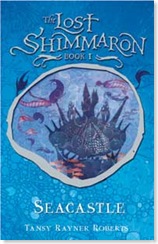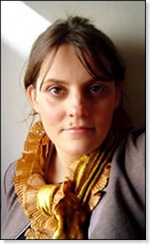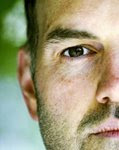Jolly nice to be able to have this chat with you, Andrew, as one of those on the rise within speculative fiction, I thought it would be good to get an interview with you before you got too big and too famous to want to talk to me.
Why, thank you, Sir. It's a pleasure to be here. Although I don't think there'll ever be a time I would be too big to talk to you... unless I was so big my larynx collapsed under its own weight and my lungs were unable to create the extraordinary pressures needed to breathe.
1. Well you've been on the Australian scene for quite some time now as artistic editor and illustrator, why the move over to fiction, and how does that feel at the present?
I'm not sure if it was actually a move from one to the other. In my mind I've probably always seen myself as a writer first. I know I was writing my own stories pretty much as soon as I could string a sentence together. Back then, I think I had this notion that all stories were illustrated. All the books I owned had illustrations, and so my stories needed illustrations too. Being quite a solitary child, I gave myself the task.
I don't think I was ever really a huge comics fan, but for me, words and images seemed to always go together. I was always writing though, secretly for much of my life. I never really felt the need to show others the stories or poetry I was writing. I kept drawing too, until the end of Yr12 Art in High School. My art teacher didn't see 'illustration' as art. And, as I chose air-brushing for my major works instead of the more traditional oil-painting or sculpture – and the fact that I didn't have breasts, which he enjoyed looking at more than the artworks – my teacher marked me down and told me "if you can't paint or sculpt, you'll never be an artist". I gave up for a long while after that.
It wasn't 'til I got fed up after 8yrs working in Purchasing and Logistics that I said 'stuff it!' and started my own graphic design business. I had no training, and little real experience, but lots of drive and ambition. I think that has worked out pretty well for me. Running my own business also gave me the time to concentrate a little more on my writing. Joining a couple of online writing groups in 2002 – plus constant pressure from my wife – gave me the confidence to finally start sending some of my writing out into the market place. So far, that's worked out pretty well for me too.
Having my writing accepted for publication sort of feels like I've finally got to the place I wanted to be right from the start. I'll never give up illustrating, but it was almost like it was always more of a stepping stone than a goal.
Sounds brilliant and very much as though things are moving in the right way!
2. In terms of you being a newbie to the writing scene (in terms of publication) but having being involved in the industry as a whole for quite some time now, do you think you have come in the Australia speculative fiction scene at the right time, how do you assess it just now?
Oh yes! Most definitely. Australian Spec-fic is going great guns at the moment – here and overseas. Fantasy and Science Fiction authors such as Trudi Canavan, Karen Miller, Jennifer Fallon, Sean Williams and Marianne de Pierres have really started making names for themselves in international markets. Some of the Aussie short story writers have created some buzz too.
The small-press scene is still chugging along much as it always has, but I think the big difference is that the product has become much more refined and professional. Some of the anthologies that have come out over the last 2yrs, and those that are slated for release this year or next, look like they are going to be absolutely brilliant.
I'm pretty proud to call myself predominately a 'horror' author over here at the moment too. The formation of the Australian Horror Writers Association has done an enormous amount both for its members and to increase the awareness of horror fiction in the general media. Will Elliott's 'The Pilo Family Circus' winning the ABC Fiction Award was quite a coup for horror fiction, and films such as Wolf Creek, Rogue and the Australian written Saw have done enormous amounts to bring 'horror' back to the masses. The resurrection of 'Horror' is a worldwide phenomena at the moment, and I think Australia is really riding the crest of that wave.
I didn't realise Saw was Australian written, although have tended to avoid those type of films – enjoyed Wolf Creek though!
3. You mention horror as a particular favourite of yours. Who got you started with your own writing and who are your inspirations now?
I remember my Great Grandfather telling 'The Monkey's Paw' on a stormy night when I was really young. That scared and excited me a lot. And my grandmother cleaned a local library at night. She'd pick me up each evening and I'd browse the shelves, all on my own, for a couple of hours while she cleaned. The library was dark and very, very empty and silent. That was really creepy, but I loved it, searching those dark shelves. That atmosphere probably helped refine my enjoyment of the darker literature.
I was watching the early Universal and later Hammer Horror films from a pretty young age too, and I read 'Carrie' when I was nine years old. From there I immediately grabbed a copy of 'Cujo' and the 'Nightshift' collection and I was pretty hooked on Stephen King from then on. My love of horror literature (both old and new) just sort of blossomed from there.
I'm pretty inspired these days – at least in my mind if not in my writing – by authors such as Mark Z. Danielewski and Chuck Palahnuik. 'House of Leaves' was a pretty amazing book – what it did with the way written stories can be told really had me scared whilst reading a book for the first time in years. Palahnuik is good too. Some of the tales in 'Haunted' were just wonderful. Others fell a little short of the mark and one – you know the one – went a little too far for my mind, but I feel he's really trying to do something different. Otherwise, Stephen King still gets me going when he writes well - 'Duma Key' was a good return to form. And Dan Simmons: when he writes horror it always impresses me. 'The Terror' was definitely one of my favourite books of 2007.
*nods* some good stuff there and interesting with the library story, sounds fun! I've never been a big lover of King but then that's just me.
4. What would be your advice for new authors then, or at least those trying to break into the market?
My advice on writing is only ever one thing – just write! I'll have plenty of advice once you've actually written something – on grammar, on character and plot and voice – but until then my advice is just to write.
There is a lot you can read on how to write and every author seems to have a different opinion. I'm sure their advice works for them, and I'm sure I have my own idiosyncrasies, but I don't think there is ever any 'magic bullet' advice. You could spend your entire life reading up on 'how to write' and never get anything accomplished. I think that is a very big trap some people get caught up in.
And, when you do write, just write the story that you want to read. Don't try and fit it into a market or a genre or worry about whether it will fit into the roster of Publisher X. I think doing that does a great disservice to the story you are trying to tell.
Then, once you're done, don't be afraid to send your stories out there into the market place. That is a hard step for first authors to take. If you're still a bit insecure about your writing, there are plenty of writing groups – both 'real-person' and online – that can offer advice and support.
I think that sums it up perfectly, I don't think I've met two writers yet who have the same technique for writing!
5. Moving on to your artwork now and there have been some rather big developments there too. Care to tell us about them?
Well, "Shards" is probably the biggest thing, and definitely the most challenging. "Shards" is a book of 40 short stories (mainly flash) written by Shane Jiraiya Cummings and due out from Ticonderoga Publications in October. I'm doing the cover and illustrating all the stories with full page black and white images and have been working on this with Shane for around 2yrs now. I'm quite eclectic in my artistic style and methods and trying to keep all 40 images in a coherent style that carries through the entire book has been quite tough. Shane is a brilliant author and the stories are sometimes quite hard to find the right image to illustrate without giving everything away with a glace. This is especially hard with the flash fiction where you don't have too many words to work with. I'm very happy with the results though and with how the constraints have helped me develop my own style.
Other than that, I have an illustration and a short interview forthcoming in multiple Stoker winner Jonathan Maberry's next non-fiction book "They Bite". I've also done the cover for Eneit Press's next installment in the 'In Bad Dreams' anthology series and have an illustration for a Nathan Burrage story in Aurealis #40.
Productive indeed!
6. What do you do when you're not writing?
I design and develop websites and maintain quite a few for my clients. That's still my main bread and butter. I also do graphic design work, commission artwork for Aurealis and do all the layout and typesetting for each issue. On weekends I work in a bookshop.
I play with my boys whenever I can and spend a couple of hours each night just chatting with my wife about stuff. I don't watch too much TV anymore, although there are a few series (Deadwood, FarScape, Firefly) that I've enjoyed watching in their entirety on DVD. I play computer games every now and then but I'm bored if there isn't a decent storyline or enough freedom for me to play the game the way I want to. Recently I've really enjoyed Far Cry, BioShock and Stalker:Shadow of Chernobyl... especially Stalker, which is a very dark and atmospheric game, and very open ended in its gameplay. You can basically go where you want and do what you want. You can create your own story and I like that in a game.
Most of the time though, I'm just reading and/or listening to music. There are too many good books out there that I haven't discovered yet for me to ever stop reading.
Stalker is something I've been thinking about... hmm...
7. What is speculative fiction then?
Probably the toughest question of all. A marketing term? A catch-all phrase for genre fiction that is not Crime or Romance? I personally think that all Speculative Fiction can be classed as "What if....?" stories regardless of which sub-genre they tend to filter down to. That includes Science Fiction, Science/Epic/High/Urban Fantasy, Horror, Alternate History, Slipstream and many others. I'm the sort of person that doesn't really have a preference either. I'm just as happy reading or writing in any of those sub-genres of Speculative Fiction.
*nods* I think the fact that the descriptions have varied in my short section of interviews says much about the term.
8. Onto a topic now that we have spent many hours discussing and that is music. How important is music to you when you write and are you a believer in mood music or can you write to anything?
Yes, music is very important to me. I can't really accomplish much in my life without having some sort of soundtrack behind it, and writing is no exception. I've tried to write in silence a few times and it has been an absolute disaster. Music seems to really help insulate my mind from the distractions of the outside world and, living next to a main road and having two young boys in the house, I've got plenty of those. I've got pretty broad musical tastes and most of the time, especially whilst doing art or coding a website, I can just keep my music collection on random. 4,500 songs, and I never know what's coming up next. It is like having your own radio station!
When I'm writing though, I tend to find mood music to suit the story. I listened to lots of Dead Can Dance, and all sorts of TajikPop and traditional Tajik music whilst writing 'Daivadana' for In Bad Dreams 2. I can possibly take that to a little bit of an extreme sometimes though. Whilst writing 'All the Clowns in Clowntown' (forthcoming in the 'Macabre' anthology) I thoroughly alienated my family by playing nothing but hour-after-hour of Circus marches like Sousa's 'Liberty Bell March' (better known as the Monty Python theme). They threatened to take my computer away from me if I didn't stop.
Heh, must remember to dig out my old The Best Circus Themes in the World Ever (vol. 18)
Really? You've got a copy of vol.18? I think that's the only one of the 50 volume set that I'm missing!!
Oh, I'll do you a copy! *uncrosses fingers*
9. So what's your future plans, what's coming up for Mr. McKiernan?
The rest of this year looks like the time when all my submissions and acceptances will see the light of day. I've got stories in Brimstone Press's 'Macabre: A Journey Through Australian Horror", Shadowed Realms webzine and Black Box anthology, as well as one in 'In Bad Dreams 2' and Aurealis #42. There are a couple of other completed shorts that I'm still shopping around.
After that, I've got some stories you'll have a big hand in bringing to the public. My Gilgamesh story for Gilgamesh Press is finished the research stage and just about to hit the hard writing stage. The research has been a lot of fun, and I think the writing will be even more fun. I've also got a God Machine story to produce for Morrigan Books and I've got a lot of ideas percolating for that one.
When I'm done with those it will be back into novel mode. I've got a total of 8 already planned (two trilogies and two stand-alones) and one stand-alone is already about 1/2 done. By the end of next year I expect to have at least two of them completed and looking for homes.
Taking it easy I see then...
10. I know you've moved away from the web design a little over recent months but would you have any advice for authors wanting to set up their own site (or indeed fancy a revamp of their existing one)? What should they be doing/not doing?
I think author sites have become a pretty essential part of marketing your work these days. The internet is a great tool for social networking, and book readers are a big part of that. Word of mouth through internet channels has been extremely effective for a number of authors and their websites have played a big part in getting that information out there and keeping readers informed.
My main piece of advice is... get a professional to do it. I'm not just saying that to get business either, as I'm happy to be moving away from web work. But, if your site looks unprofessional people will assume your work is too.
Also, don't overburden yourself! If you spend too much time updating a fancy website you'll leave little time for writing. If you don't think you can maintain a regular author-blog, don't commit to one in the first place: no blog at all is better than one that hasn't been updated in 12 months. If you can't see yourself spending an hour a day writing a blog post, you're better off just posting a bio, a list of your published works, and maybe an extract or two.
Only do what you can manage, and don't let it take away from your writing time. That's probably the best advice I can give.
All sound advice, I'd agree with pretty much all of that too.
Thank you so much for coming along Andrew and I hope all goes well for you on all fronts for many years to come!
My pleasure, and thanks very much for inviting me along.





